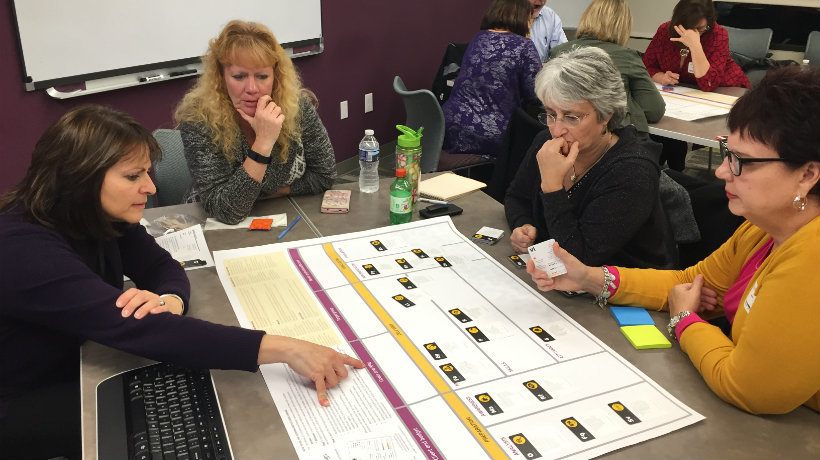Instructional Design And The Design Thinking Process
In many cases the conceptual part of an Instructional Design process is neglected. We don't have time, we don't have tools, we don't know how to ideate learning solutions in an efficient way. As a result, we end up with a routine solution, aligned tightly with our own knowledge, skills, biases, and comfort zone. It is very hard to design great training process based on such an approach.
Instructional Design process could be effectively supported by design thinking approach with all of its key features. Human centricity, collaboration, iteration, verification of ideas with prototypes, and creativeness based on the fun factor; all these should drive Instructional Designers to better results.
In Accenture we implement design thinking techniques in various business areas based on the following process comprising 6 stages starting from discovery, through description, ideation, prototyping, testing, and ended on implementation of the new or revamped service or product.
This structure could be effectively used in a combination of any Instructional Design model, such as ADDIE, 9 Events of Instruction, ARCS, etc.
There are many tools and techniques which help to implement design thinking in the Instructional Design space. We can take as an example "Etnographic Research" during the discovery phase, "Personas" which are being used during description phase, or "Pilots" which are used in the testing phase.
We can also use Learning Battle Cards tools (more about the tools and value they bring in the design thinking process is available here and here) which, apart from fun and collaboration factor, bring also a structured approach to the process.
Learning Battle Cards is a set of tools created in the crowdsourced way helping Instructional Designers in their efforts. It consists of a few solutions:
- The deck of cards helping to brainstorm the optimal portfolio of methods which could be used during the training.
- LBC Canvas helping to organize and structure thinking about the learning journey.
- LBC Maps helping to trigger out-of-the box thinking about the Instructional Design challenge.
While using these tools, we can also trigger all benefits of design thinking methodology, such as collaboration, human-centricity, fun, prototyping, and iteration.
You can find more information about Learning Battle Cards here.
Instructional Design Thinking Session On DevLearn
If you are coming this year to DevLearn, you can experience Ιnstructional Design thinking using Learning Battle Cards and LBC Canvas. On my session (10:45 AM on the 25th of October) after A short introduction to the concept, and tools we will be:
- Working out a development case by brainstorming the optimal portfolio of learning tools, and methods using the deck of Learning Battle Cards.
- Ideating and visualizing the structure of it, using LBC Canvas.
The Deck Of Learning Battle Cards
Learning Battle Cards is a deck of 108 cards used as a reminder of learning approaches and tools. It could be used as a brainstorming tool which supports discovery and exploration of Instructional Design methods. As a kinesthetic tool it brings a lot of fun and engagement which is one of the key elements of the design thinking process.
Every card from the deck brings additional information about learning approach which let to use them in a deliberate way.
LBC Canvas
LBC Canvas creates the backbone for the whole family of LBC tools. It provides a structure call "7 Windows of Instructional Design" on a big sheet of paper which, in fact, is a framework of thinking about the learning process. It consists of 7 spaces ("windows") which should be taken into consideration while working on instruction. From one perspective, it curbs the creativity of the Instructional Designer, from the other, however, it brings structured, end-to-end way of thinking about changing behaviors of trainees (which is the ultimate goal of every single learning intervention).
Learning Objectives Of The Session
The session will focus on available tools, and frameworks (such as design thinking process, process canvas, etc.) which could support Instructional Designers in their efforts. After the session participants will:
- Understand design thinking approach.
- Learn how design thinking can support Instructional Design process.
- Learn about tools and frameworks to be used in the Instructional Design Thinker role.
- Braistorm and prototype their own learning process.
- Build a plan of bringing sparks of design thinking to their Instructional Design team.
I am looking forward to meeting you there!
